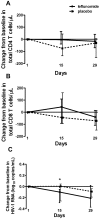The effect of leflunomide on cycling and activation of T-cells in HIV-1-infected participants
- PMID: 20689824
- PMCID: PMC2914784
- DOI: 10.1371/journal.pone.0011937
The effect of leflunomide on cycling and activation of T-cells in HIV-1-infected participants
Abstract
Background: The pathogenesis of immunodeficiency due to human immunodeficiency virus (HIV)-1 is incompletely understood, but immune activation is believed to play a central role. Immunomodulatory agents that decrease immune activation may be useful in the treatment of HIV-1 infection.
Methodology: A randomized, double blind, placebo-controlled pilot study of leflunomide for 28 days was performed in participants with HIV-1 infection who were not receiving antiretroviral therapy. Participants randomized to leflunomide were subsequently treated with cholestyramine until leflunomide levels were below detection limit.
Findings: Treatment with leflunomide was well tolerated with mostly low-grade adverse events. Leflunomide administration reduced cycling of CD4 T cells (by ex vivo bromodeoxyuridine uptake and Ki67 expression) and decreased expression of activation markers (HLA-DR/CD38 co-expression) on CD8 T cells in peripheral blood. In addition, decreased expression of HIV-1 co-receptors was observed in both CD4 and CD8 T cells in the leflunomide group. There were no significant changes in naïve and memory T cell subsets, apoptosis of T cells or markers of microbial translocation.
Conclusions: Leflunomide was effective in reducing immune activation in the setting of chronic HIV-1 infection suggesting that targeting immune activation with immunomodulatory agents may be a feasible strategy.
Trial registration: ClinicalTrials.gov NCT00101374.
Conflict of interest statement
Figures




References
-
- Liu Z, Cumberland WG, Hultin LE, Kaplan AH, Detels R, et al. CD8+ T-lymphocyte activation in HIV-1 disease reflects an aspect of pathogenesis distinct from viral burden and immunodeficiency. J Acquir Immune Defic Syndr Hum Retrovirol. 1998;18:332–340. - PubMed
-
- Liu Z, Cumberland WG, Hultin LE, Prince HE, Detels R, et al. Elevated CD38 antigen expression on CD8+ T cells is a stronger marker for the risk of chronic HIV disease progression to AIDS and death in the Multicenter AIDS Cohort Study than CD4+ cell count, soluble immune activation markers, or combinations of HLA-DR and CD38 expression. J Acquir Immune Defic Syndr Hum Retrovirol. 1997;16:83–92. - PubMed
-
- Hazenberg MD, Otto SA, van Benthem BH, Roos MT, Coutinho RA, et al. Persistent immune activation in HIV-1 infection is associated with progression to AIDS. Aids. 2003;17:1881–1888. - PubMed
-
- Anthony KB, Yoder C, Metcalf JA, DerSimonian R, Orenstein JM, et al. Incomplete CD4 T cell recovery in HIV-1 infection after 12 months of highly active antiretroviral therapy is associated with ongoing increased CD4 T cell activation and turnover. J Acquir Immune Defic Syndr. 2003;33:125–133. - PubMed
-
- Silvestri G, Sodora DL, Koup RA, Paiardini M, O'Neil SP, et al. Nonpathogenic SIV infection of sooty mangabeys is characterized by limited bystander immunopathology despite chronic high-level viremia. Immunity. 2003;18:441–452. - PubMed
Publication types
MeSH terms
Substances
Associated data
Grants and funding
LinkOut - more resources
Full Text Sources
Medical
Research Materials

